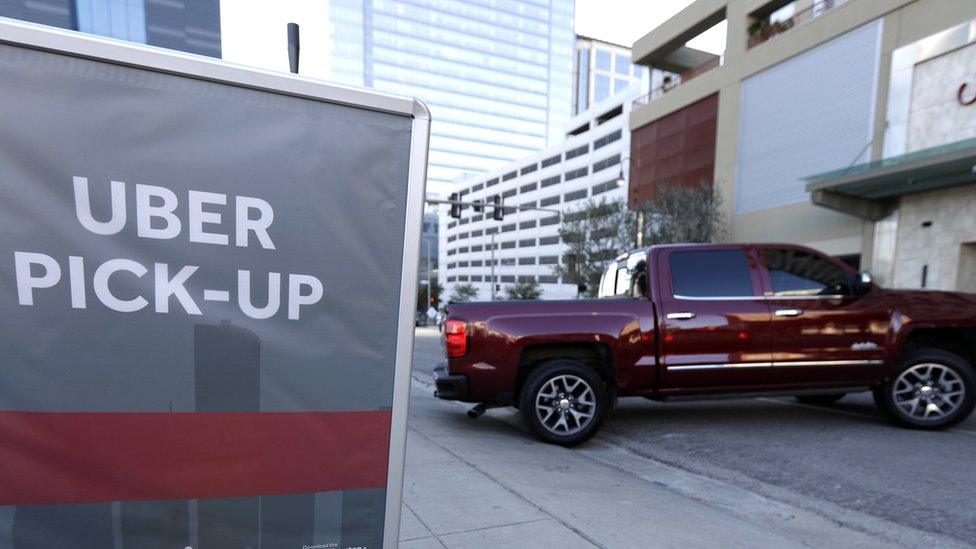Uber investigates 'abhorrent' sexism claims
- Published

The allegations are the latest in a series of controversies around Uber
Ride-sharing company Uber has said it will conduct an “urgent investigation” into claims of sexual harassment at the company.
A blog post written by former Uber engineer Susan Fowler, external detailed a litany of instances during her time at the firm.
"What she describes is abhorrent and against everything Uber stands for and believes in,” Uber boss Travis Kalanick said in a statement.
“Anyone who behaves this way or thinks this is OK will be fired.”
The controversy is just the latest to surround the company, particularly on issues around the treatment of women at the firm.
Ms Fowler wrote that shortly after joining the San Francisco-based company, her new manager made sexual advances towards her.
She wrote: "He was trying to stay out of trouble at work, he said, but he couldn't help getting in trouble, because he was looking for women to have sex with.”
Lack of diversity
After reporting the incident to Human Resources, Ms Fowler said she was told no further action would be taken as it was a “first offense”. She said she was told she should try and join an alternative team at the company.
From here, she goes on to list several instances where she felt poorly treated. She cites data - which the BBC has been unable to verify - that the number of female engineers at the company has plummeted over the past year.
Unlike Google, Apple, Facebook and others, Uber chooses not to disclose figures about diversity at the company.
On Sunday evening, Mr Kalanick responded to the allegations.
"I have just read Susan Fowler's blog.
"It's the first time this has come to my attention so I have instructed Liane Hornsey, our new Chief Human Resources Officer, to conduct an urgent investigation into these allegations.
"We seek to make Uber a just workplace and there can be absolutely no place for this kind of behaviour at Uber.”
The BBC has attempted to contact several high-profile Uber investors for comment.
Posting on Twitter, Jason Calacanis - an early investor in the firm - wrote: "What she [Ms Fowler] describes is obviously not acceptable. Trust management will take swift action."
'Leather jacket reward'
The row is bringing concerns over sexism in Silicon Valley once again to the fore - with Ms Fowler's blog post provoking a sense of deja vu for many in the industry.
While Ms Fowler's post was about Uber, several noted on Sunday that her experiences were instantly recognisable to other women working for firms in Silicon Valley and the wider technology industry.
That said, some of the anecdotes detailed in Ms Fowler's 3,000-word post range from the shocking to the farcical.
After making the initial complaint about her manager, she said she was threatened with getting negative performance review scores - making it harder to gain promotions or transfers within the company.
She said she was chastised for keeping email evidence of her complaints.
One of the more bizarre instances involved leather jackets. Ms Fowler described how the team she was on had been promised leather jackets as a thank you for their work, and the team was measured up for the right sizes.
Ms Fowler wrote: "One day, all of the women (there were, I believe, six of us left in the org) received an email saying that no leather jackets were being ordered for the women because there were not enough women in the organisation to justify placing an order.
"I replied and said that I was sure Uber could find room in their budget to buy leather jackets for the, what, six women if it could afford to buy them for over a hundred and twenty men.
"The director replied back, saying that if we women really wanted equality, then we should realise we were getting equality by not getting the leather jackets."
'Preparing to quit'
Since being founded in 2009, Uber has gained a reputation as a company that espouses Silicon Valley's so-called "bro" culture of male-dominated, macho work environments.
That view was exacerbated three years ago when Mr Kalanick quipped, in an interview with GQ Magazine, that an on-demand service for women might be called "Boober".
In 2014, Buzzfeed reported that Uber executive Emil Michael had suggested the firm would spend money on digging up dirt on Sarah Lacy, a technology journalist who accused the firm of being misogynistic., external
This latest, most detailed critique of the company's working culture is perhaps the most damaging yet.
"When I joined Uber, the organisation I was part of was over 25% women," Ms Fowler wrote.
"By the time I was trying to transfer to another [engineering] organisation, this number had dropped down to less than 6%.
"Women were transferring out of the organisation, and those who couldn't transfer were quitting or preparing to quit."
She now works at payments company Stripe, also based in San Francisco.
Follow Dave Lee on Twitter @DaveLeeBBC, external and on Facebook, external